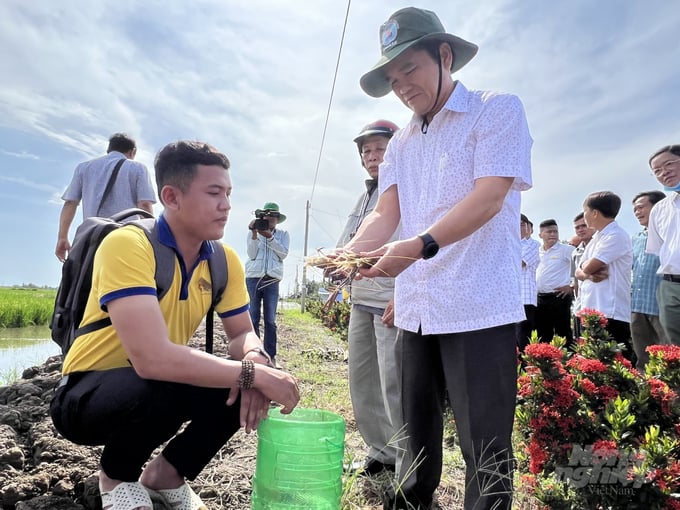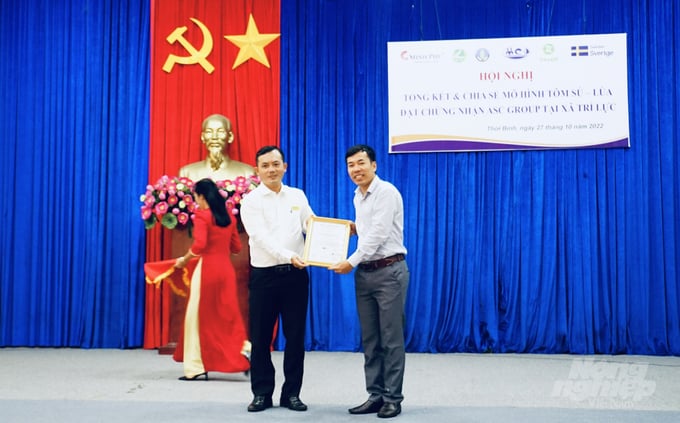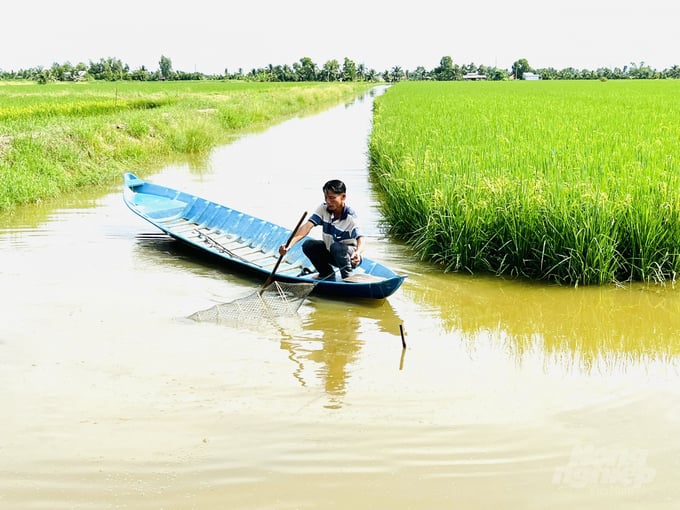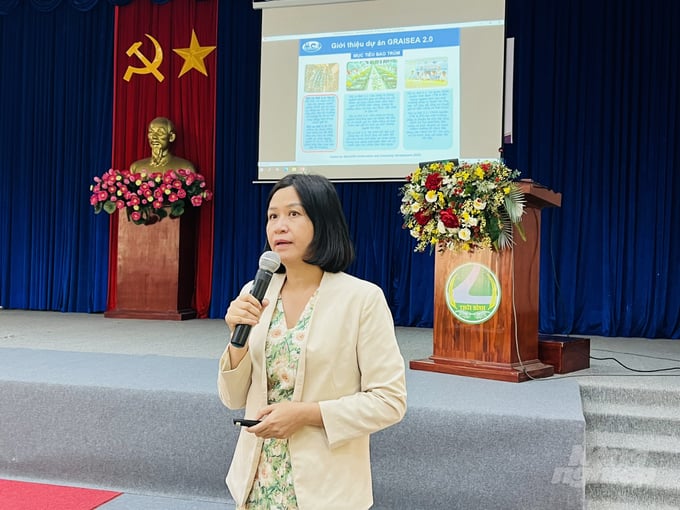May 21, 2025 | 08:13 GMT +7
May 21, 2025 | 08:13 GMT +7
Hotline: 0913.378.918
May 21, 2025 | 08:13 GMT +7
Hotline: 0913.378.918
ASC is the worldwide standard for fisheries and is considered as a passport for seafood seeking access to the world's most lucrative markets. To get the paper, not only is seafood needed to satisfy food safety standards but also agricultural regions must avoid unfavorable environmental and ecological system effects.
The Centre for Marine Life Conservation and Community Development (MCD), Thoi Binh District People’s Committee and partners have organised a workshop about the shrimp-rice farming moder that get ASC certification in Tri Luc Commune.

Deputy Director of Ca Mau Province’s Agriculture and Rural Development Department Chau Cong Bang visit the shrimp-rice farming model in Tri Luc Commune. Photo: Trong Linh.
Ca Mau is a locality with great potential and advantages in fisheries development, especially shrimp farming, with three sides facing the sea, a coastline of over 254km, and over 80 estuaries connecting to the sea affected by two typical tidal regimes of the East Sea and the West Sea. Most of Ca Mau's land area has good quality water sources, meeting the needs of shrimp farming, with over 302,000 hectares of aquaculture, including over 280,000 hectares of brackish water that are suitable for shrimp farming.
Currently, Ca Mau shrimp has been certified by many international organisations including ASC, B.A.P, GlobalGAP, EU, and Naturland. The province has 30 enterprises, 32 processing and exporting shrimp factories with modern equipment and technology. Their total capacity reaches over 250,000 tonnes of raw shrimp per year. Most of the factories meet international standards (SA-8000, ISO 26000, ISO-9001, BRC, B.A.P). Ca Mau shrimp has been present in over 90 countries and territories, the four main markets are the US, Japan, EU and China.
The potential, advantages, and values of Ca Mau shrim made an important contribution and plays decisive role in the development of Vietnam's shrimp industry now and in the future.

Representative of Control Union awarded ASC certificate to Minh Phu social enterprise. Photo: Trong Linh.
The shrimp industry is identified as a key economic sector, accounting for 80 per cent of the total production value, accounting for 49 per cent of the total production value of the agricultural sector in Ca Mau province. More than half of the province's population (about 600,000 people) have their livelihood relating to shrimp industry. The industry directly affects the jobs of over 350,000 workers, of which 300,000 are directly involved in shrimp farming.
Currently, Ca Mau has over 37,000ha of shrimp and rice production,mostly in districts of Thoi Binh, Tran Van Thoi, U Minh, Cai Nuoc and Ca Mau city. The feature of this model is the low density stocking of shrimp in the dry season and rice cultivation in the rainy season. The average yield of shrimp cultured on rice-growing land ranges from 300-350kg per ha per year.
In Tri Luc commune that is granted ASC certification, there are 2.900 ha of aquaculture area including 700ha of organic shrimp - rice farming. Currently, Tri Luc Cooperative is associated with Minh Phu social enterprise. In 2019, 329 households signed contracts and conduct assessment of shrimp farming according to standards. Up to now, 252 households with an area of 565ha have been assessed and certified to achieve ASC.

With the potential, advantages, and values, Ca Mau shrimp made an important contribution and plays a decisive role in the development of Vietnam's shrimp industry. Photo: Trong Linh.
Farmer Tran Van Tinh from hamlet 9, Tri Luc commune said that his family participated in the ASC certification model with an area of 4ha.
Previously, his farming with conventional production saw unstable input and output.
"When participating in the model, I feel very secure as firstly, it both protects the environment and improves the value of fragrant rice and clean shrimp. Once participating in the model, everyone produce at the same time and receive technical guidance to ensure quality. Thirdly, after ASC certification, the output is very secure. Our product are always consumed at the higher price, about VND1,000 - 3,000 VND/kg higher than the market price." Tinh said.
Than Thi Hien, Deputy Director of Center for Marine Conservation and Community Development (MCD) highly appreciated the cooperation of partners in Ca Mau province and Tri Luc cooperative members to make shrimp - rice model successful.
The operation of the shrimp-rice model showed the community's interest in the role of women in sharing work responsibilities in the family and in production and business, she said.
“MCD wishes to continue to connect partners, resources and technologies so that women-owned adaptive livelihood initiatives are increasingly supported and spread,” she said.
The project "Strengthening gender equality in the shrimp value chain and agribusiness investment in Vietnam and Southeast Asia" - GRAISEA 2 was implemented by MCD in collaboration with partners in Ca Mau with the support from OXFAM. The project aims to strengthen the capacity of small-scale producers, especially women, to receive equal opportunities and benefits. The project also aims to support enterprises to increase business efficiency, and to implement the standards of social responsibility in the shrimp value chain adapting to climate change.
Chau Cong Bang, Deputy Director of Ca Mau Department of Agriculture and Rural Development, said that the shrimp-rice farming model in Ca Mau province played a very important role, especially in the current climate change conditions. Ca Mau province has a total shrimp-rice area of about 40,000 ha. It its orientation to develop agricultural production to adapt to climate change, the shrimp-rice model will expand the shrimp-rice area to make use of salt instrusion area. This is considered a great potential and advantage of Ca Mau province.

Than Thi Hien, Deputy Director of MCD highly appreciated the cooperation of partners in Ca Mau province and members of Tri Luc cooperative on shrimp-rice model. Photo: Trong Linh.
Previously, in Tri Luc commune, farmers grew rice only but now, they switched to a combination of rice - shrimp, contributing to double people's income and better preserve environment.
According to Bang, when combining rice with shrimp that meet the prescribed conditions, the environment will be clean, ensuring sustainable development conditions, which is a very important factor in the current climate change conditions. In the past time, stakeholders have made efforts to build ASC certified rice-shrimp production area, Ca Mau province's agro-industry has been very determined together with Minh Phu Social Enterprise and NGOs to develop the project.
Up to now, the province has 600ha get ASC certification, with 252 households.
When achieving ASC certification, black tiger shrimp products will be exported to many markets. The black tiger shrimp – rice model in Tri Luc commune, Thoi Binh district is the first of its kind in Vietnam to get ASC certification.
Currently, Ca Mau is planning ecological and organic shrimp-rice areas, mainly in the North Ca Mau region. By 2030, it targets to have all 40,000ha of shrimp-rice area to achieve one of the international certifications.
Translated by Hien Anh

(VAN) Japan's grant aid project contributes to capacity building, promoting organic agricultural production, and fostering sustainable community development in Dong Thap province.

(VAN) For years, the CRISPR-Cas9 genome technology has been reshaping genetic engineering, a precision tool to transform everything from agriculture to medicine.

(VAN) Vietnam aims to become a 'leader' in the region in the capacity and managing effectively soil health and crop nutrition.
![Reducing emissions from rice fields: [Part 1] Farming clean rice together](https://t.ex-cdn.com/nongnghiepmoitruong.vn/608w/files/news/2025/05/05/z6509661417740_a647202949c539012a959e841c03e1d3-nongnghiep-143611.jpg)
(VAN) Growing clean rice helps reduce environmental pollution while increasing income, allowing farmers to feel secure in production and remain committed to their fields for the long term.
/2025/05/19/5136-1-144800_230.jpg)
(VAN) The Nghe An Provincial People's Committee has just approved the list of beneficiaries eligible for revenue from the Emission Reductions Payment Agreement (ERPA) in the North Central region for the year 2025.

(VAN) 14 out of 35 domesticated elephants in Dak Lak province have had their living conditions improved, with 11 of them currently participating in the non-riding elephant tourism model.

(VAN) Muong Nhe Nature Reserve hopes that being upgraded to a national park will lay the foundation for forest protection efforts to be carried out in a systematic, modern, and sustainable manner.